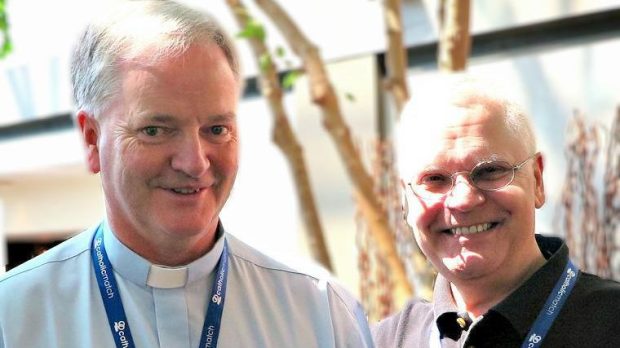Lenten Campaign 2025
This content is free of charge, as are all our articles.
Support us with a donation that is tax-deductible and enable us to continue to reach millions of readers.
A terrific interview with Bishop Paul Tighe in The Jesuit Post, today that really manages to showcase the man and a little bit about how the universality of the church works.
If you’re unfamiliar with Tighe, who is from Ireland, he is the secretary of the Vatican’s Pontifical Council for Culture and the man John Allen calls (rightly, by my lights) the “nicest guy in the Vatican”. With typical self-effacing humor, Tighe says of that assessment, “My mother’s reaction was quite good: ‘Well, if you’re the nicest, I wouldn’t like to meet the nastiest.’”
Prior to his job at Culture, Tighe had been secretary of the Pontifical Council for Social Communications, which put together a successful 2011 Vatican/Blogger meet-up, and got the Pope (aka @Pontifex, in every iteration) onto Twitter. Tighe tells the story succinctly:
Pope Benedict basically said, “Are you saying this is something that will allow me to reach people I wouldn’t otherwise reach with short messages of hope and it’s not going to demand a lot of work from me?” “Yes.” “Go with it. I don’t need any further explanation.” At this stage now Pope Francis, who inherited that Twitter account, has built up something over 40 million followers across the different language platforms. That’s important in itself, but more important is that we’re told by Twitter that we have a very high reach range, so that the messages of the Pope are reaching out to people who don’t follow him.
My favorite part of the interview, though, is Tighe’s simple but lovely reflection on how Catholicism quite naturally brings the world together in awareness, curiosity and faith:
I grew up in a small parish, which was linked to a diocese, which linked me to a universal church, so I had a normal, institutional feeling for church. At the same time, I attended a school that was run by the Loretto Sisters, who were people who had sent Mother Teresa of Calcutta to India, so therefore from a very early age I was hearing stories of India. Even at a very local level you were being inserted into something bigger. All the time you belonged to different networks and those different networks, which were interlocking and overlapping, were actually the source of our Catholic identity.
Very true, and worth pondering and appreciating, as is this whole interview, which I encourage you to read, here.

